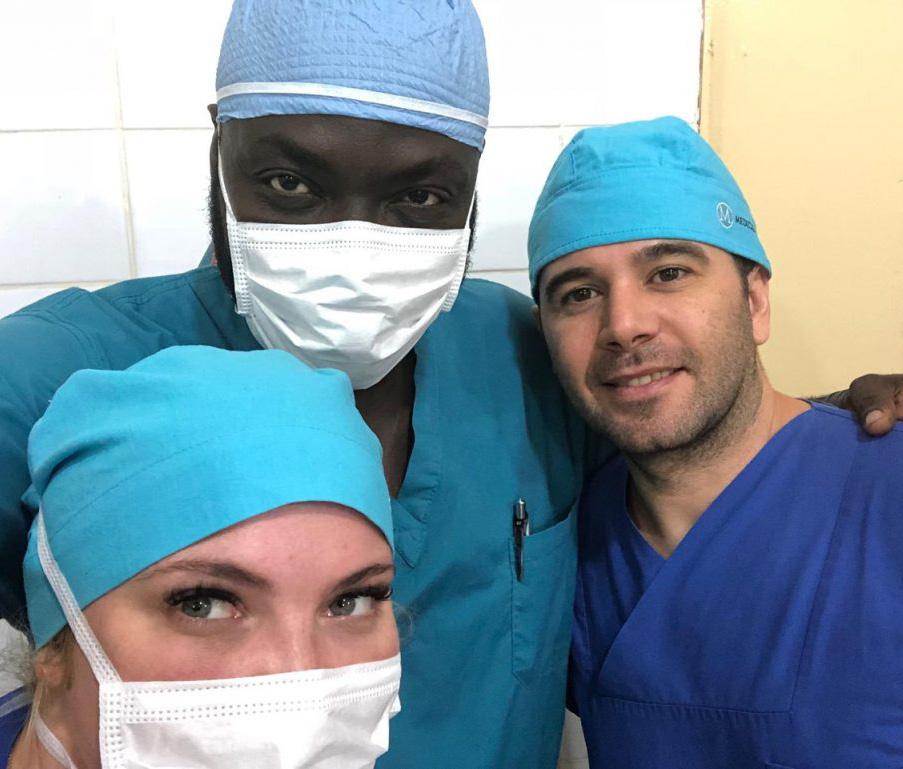
8 minute read
Plastic surgeon’s mission trips restore hope – and lives – in Ghana
Restoring Restoring Plastic surgeon's mission trips back home are helping women choose life after diagnosis By Kendra Y. Mims-Applewhite lives lives
ASPS member Michael K. Obeng, MD, first witnessed the transformative power of reconstructive surgery
at age 15 when Operation Smile volunteers came to his village in Ghana and performed surgery on a neighbor who sustained severe burns after her husband threw acid on her face. The reconstructive procedure brought her out of hiding, he notes.
“This woman became a recluse and never left her home,” Dr. Obeng recalls. “I didn’t know much about medicine at the time, but when I saw the impact of Operation Smile, I knew I wanted to become a surgeon when I grew up. I never forgot that moment.”
Dr. Obeng, now a Beverly Hills plastic surgeon, came to the United States at age 20 and pursued a career in plastic surgery. During medical school, his mentor, ASPS member John H. Miller, MD, suggested they lead a mission trip to Ghana to provide free reconstructive surgery, but he was unable to do so due to his busy schedule. Still, the idea stayed with him. Eight years later, Dr. Obeng founded his nonprofit R.E.S.T.O.R.E (Restoring Emotional Stability Through Outstanding Reconstructive Efforts) Worldwide Inc., to provide free reconstructive surgery in developing countries to children and adults with congenital and accidental deformities. To date, Dr. Obeng and his RESTORE team of volunteers have traveled to seven countries and provided more than 1,000 surgeries.
After learning the grim breast cancer mortality rate for Ghanaian women (more than 15 percent), Dr. Obeng returned to his home country for his nonprofit’s first mission trip and performed the region’s first immediate breast reconstruction in 2009 using abdominal tissue on a nurse who had refused to undergo a mastectomy without reconstruction because she feared losing her husband – a widespread concern among Ghanaian women, he notes. Several RESTORE
mission trips focused on breast cancer and breast reconstruction, and he says he hopes the organization’s efforts in Ghana can alleviate women’s fear and change their mindset, as many women prolong treatment until they are in advanced stages of the disease. “Women in their 40s presented with stage 3 and 4 breast cancer,” he says. “Young women were dying because they didn’t want to have a mastectomy. They Michael K. Obeng, MD are so afraid. Many would rather die with their breasts than to have a mastectomy,



and not have a surgeon there to perform reconstruction. They believe you’re not a woman if you don’t have breasts. We let them know losing your breasts from cancer does not make you less of a woman.”
He adds that their fear also stems from the country’s history of poor surgical outcomes. Part of his nonprofit’s mission is to educate local healthcare personnel. To that end, Dr. Obeng has taught local surgeons how to perform breast reconstruction, and he’s confident they can now provide quality care.
“When I was growing up in Ghana, surgery was a death sentence – most people did not make it,” he explains. “Women don’t feel comfortable having surgery. We train surgeons so that they can train their staff after we leave. We educate them to make the public feel more confident in the surgeons they have there. We want to ensure the local surgeons are trained and comfortable to perform breast reconstruction.”

To raise awareness about breast reconstruction and educate women about
Survivor and breast reconstruction advocate Beth Goodman visits women’s clinics and shares her story of survivorship during Ghana’s inaugural Breast Reconstruction Awareness Day in 2018.

the procedure, Dr. Obeng collaborated with Paa Ekow Hoyte-Williams, MD, head of plastic surgery at Komfo Anokye Teaching Hospital (KATH), to host Ghana’s first Breast Reconstruction Awareness Day in 2018. As part of the commemoration, KATH’s plastic and reconstructive surgery division raised funds to provide free breast reconstruction surgeries for five patients.
The week-long celebration and public awareness campaign included radio and TV presentations, a health walk, medical screenings and educational events in the communities. Dr. Obeng sponsored his patient Beth Goodman’s trip to Ghana to promote breast reconstruction and share how the procedure had a positive effect on her life. As a 10-year breast cancer survivor and breast reconstruction advocate, Beth candidly provided her perspective on bedside manner and survivorship with local surgeons during a radio interview and encouraged them to improve their patient communication while treating breast cancer patients.
“They kept referring to breast reconstruction as ‘cutting off the breast”, she says. “No woman wants to hear that. I told them how it’s simply not the cutting off the breast. It’s the removal of cancer from the body that happens to be in the breast. They said they never thought about it from that perspective. Providing a patient’s perspective can improve communication with their patients going forward.”
Beth visited women’s clinics to encourage patients undergoing chemotherapy and radiation, and to answer their questions about breast reconstruction. She vividly remembers a woman repeatedly telling her, “I don’t want to die because of a mastectomy.” Not only did Beth share her own journey, but she bared her reconstructed breasts to ease the woman’s mind.
“She stared in amazement because she couldn’t tell which breast was reconstructed,” Beth says. “I told her the cancer was going to be removed from her body and she didn’t have to be fearful. Peace came upon her. I don’t want women to be afraid. I want women to be informed.”
Beth says two sisters adamantly against breast reconstruction scheduled consultations after talking to her. She learned the stigma of mastectomy resulting in death prevents women from seeking treatment.
“When people hear mastectomy, they think they have to live with these horrid scars without the opportunity to close the loop on breast cancer,” Beth says. “They remain fearful because they don’t know their options. It’s so important – particularly with RESTORE’s efforts in Ghana – that women understand you can




(Top) Dr. Hoyte-Williams (second from right) and Beth at Ghana’s Breast Reconstruction Awareness Day events. (Bottom) Ghanaian women learn about their options after a breast cancer diagnosis.
have breast reconstruction, regain a sense of normalcy and live well after breast cancer. Dr. Obeng and his RESTORE team are helping women regain their wholeness, one procedure at a time.”
Dr. Hoyte-Williams, who was trained by Dr. Obeng, says it’s too early to assess the impact of Breast Reconstruction Awareness Day Ghana, but he has noticed progress. Clinicians are gradually beginning to inform patients about their options after a breast cancer diagnosis, he notes.
“It’s a slow process, just as it used to be in the United States,” he says. “But that doesn’t mean there’s no impact. Change is a gradual process and we must be more consistent in creating awareness to see some measurable impact.
“We’ve created awareness that didn’t exist previously,” he continues. “Over this period of raising awareness, most patients have come to know their options – and most importantly, they’re learning that breast reconstruction services are readily available in our hospital and locally. Most patients would be happy to consider breast reconstruction.”
Although Dr. Obeng’s plans to sponsor the third Breast Reconstruction Awareness Day in Ghana this October were put on hold due to COVID-19, he looks forward to resuming future mission trips to his home country and other developing countries on the continent to help breast cancer patients rebuild their lives and break the stigma around the disease. The work RESTORE started during its first mission trip to Ghana 11 years ago is proving transformational.
“When we started going to Ghana, there were four plastic surgeons,” Dr. Obeng notes. “Now they have more than 15 plastic surgeons from the work that we’ve done. RESTORE has had a tremendous impact and raised the profile of plastic surgery in Ghana. This is the legacy we want to leave behind when all is said and done.”
Breast Implants: What Patients Need to Know
Breast implants are FDA-approved devices that offer many quality-of-life benefits for patients. Each year, hundreds of thousands of patients undergo breast implant procedures worldwide. Breast implants remain an important option for breast reconstruction procedures. Collaboration among the scientific community, patient advocacy groups and governments from around the world will continue to enhance the device and ensure the global plastic surgery community works together to keep all parties educated about the latest news and advancements to improve patient safety.
Breast Implant Reconstruction Procedures
Patients considering breast implants should seek out a board-certified plastic surgeon to help weigh the benefits and potential risks to make the best possible decision. For more information on reconstructive breast implant procedures, please visit our Breast Reconstruction procedure page.
Breast Implant Safety
The American Society of Plastic Surgeons takes all patient safety concerns seriously. In collaboration with the FDA and breast implant device manufacturers, The Plastic Surgery Foundation has developed the National Breast Implant Registry (NBIR) to strengthen the national surveillance for breast implant devices in the United States. ASPS/PSF and FDA also developed a Breast Implant-Associated ALCL Registry, the PROFILE Registry, to increase the scientific data on ALCL in women with breast implants. Nearly 400,000 patients opt for breast implants every year and report no adverse effects. When a possible association with a rare disease is reported, plastic surgeons follow the science to provide detailed, accurate information for full patient consent and decision making. As noted, breast implants have been studied worldwide for decades, and the scientific literature shows no causal relationship between implants and autoimmune diseases. That’s not to say a patient could not have a negative reaction to any medical device, and if a patient desires to have her breast implants removed – for any reason – she should consult her plastic surgeon. Like any medical device, breast implants carry a risk of complications, and in the event any complication develops, patients should consult their plastic surgeon to address it in a timely manner.










